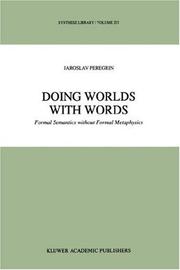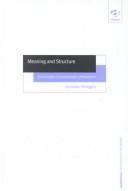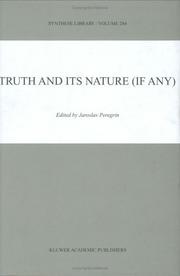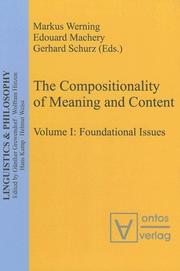| Listing 1 - 4 of 4 |
Sort by
|

ISBN: 0792337425 9048146186 9401584680 Year: 1995 Publisher: Dordrecht Kluwer
Abstract | Keywords | Export | Availability | Bookmark
 Loading...
Loading...Choose an application
- Reference Manager
- EndNote
- RefWorks (Direct export to RefWorks)

ISBN: 075460411X Year: 2001 Publisher: Aldershot Ashgate
Abstract | Keywords | Export | Availability | Bookmark
 Loading...
Loading...Choose an application
- Reference Manager
- EndNote
- RefWorks (Direct export to RefWorks)
Analysis (Philosophy) --- Structuralism --- Structure (Philosophy) --- Philosophy --- Whole and parts (Philosophy) --- Form (Philosophy) --- Poststructuralism --- Analysis, Linguistic (Philosophy) --- Analysis, Logical --- Analysis, Philosophical --- Analytic philosophy --- Analytical philosophy --- Linguistic analysis (Philosophy) --- Logical analysis --- Philosophical analysis --- Philosophy, Analytical --- Language and languages --- Methodology --- Logical positivism --- Semantics (Philosophy) --- Structuralism. --- Analysis (Philosophy).

ISBN: 0792358651 9048152801 9401592330 Year: 1999 Publisher: Dordrecht Kluwer
Abstract | Keywords | Export | Availability | Bookmark
 Loading...
Loading...Choose an application
- Reference Manager
- EndNote
- RefWorks (Direct export to RefWorks)
The question how to turn the principles implicitly governing the concept of truth into an explicit definition (or explication) of the concept hence coalesced with the question how to get a finite grip on the infinity of T-sentences. Tarski's famous and ingenious move was to introduce a new concept, satisfaction, which could be, on the one hand, recursively defined, and which, on the other hand, straightforwardly yielded an explication of truth. A surprising 'by-product' of Tarski's effort to bring truth under control was the breathtaking finding that truth is in a precisely defined sense ineffable, that no non trivial language can contain a truth-predicate which would be adequate for the very 4 language . This implied that truth (and consequently semantic concepts to which truth appeared to be reducible) proved itself to be strangely 'language-dependent': we can have a concept of truth-in-L for any language L, but we cannot have a concept of truth applicable to every language. In a sense, this means, as Quine (1969, p. 68) put it, that truth belongs to "transcendental metaphysics", and Tarski's 'scientific' investigations seem to lead us back towards a surprising proximity of some more traditional philosophical views on truth. 3. TARSKI'S THEORY AS A PARADIGM So far Tarski himself. Subsequent philosophers then had to find out what his considerations of the concept of truth really mean and what are their consequences; and this now seems to be an almost interminable task.
Truth --- Language and languages—Philosophy. --- Epistemology. --- Logic. --- Semantics. --- Modern philosophy. --- Philosophy of Language. --- Modern Philosophy. --- Modern philosophy --- Formal semantics --- Semasiology --- Semiology (Semantics) --- Comparative linguistics --- Information theory --- Language and languages --- Lexicology --- Meaning (Psychology) --- Argumentation --- Deduction (Logic) --- Deductive logic --- Dialectic (Logic) --- Logic, Deductive --- Intellect --- Philosophy --- Psychology --- Science --- Reasoning --- Thought and thinking --- Epistemology --- Theory of knowledge --- Methodology


ISBN: 3110323621 9783110323627 9783937202525 3937202528 3110323060 9783110323061 3937202528 9783110323061 Year: 2013 Volume: v. 3 Publisher: Berlin Boston
Abstract | Keywords | Export | Availability | Bookmark
 Loading...
Loading...Choose an application
- Reference Manager
- EndNote
- RefWorks (Direct export to RefWorks)
Representational systems such as language, mind and perhaps even the brain exhibit a structure that is often assumed to be compositional. That is, the semantic value of a complex representation is determined by the semantic value of their parts and the way they are put together. Dating back to the late 19th century, the principle of compositionality has regained wide attention recently. Since the principle has been dealt with very differently across disciplines, the aim of the two volumes is to bring together the diverging approaches. They assemble a collection of original papers that cover
Compositionality (Linguistics) --- Cognition. --- Meaning (Philosophy) --- Philosophy --- Semantics (Philosophy) --- Psychology --- Composition (Linguistics) --- Grammar, Comparative and general --- Semantics --- Hierarchy (Linguistics)
| Listing 1 - 4 of 4 |
Sort by
|

 Search
Search Feedback
Feedback About UniCat
About UniCat  Help
Help News
News